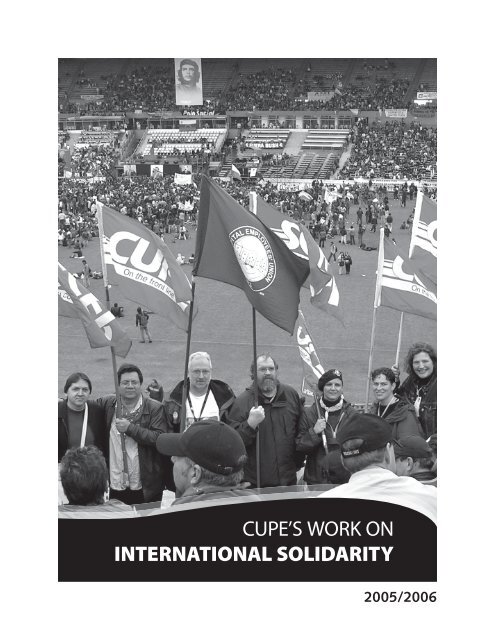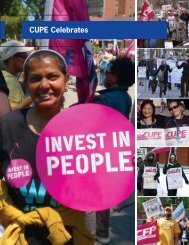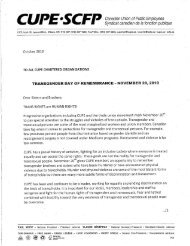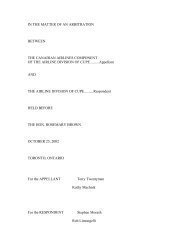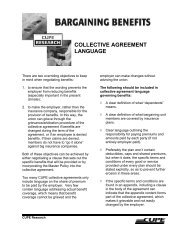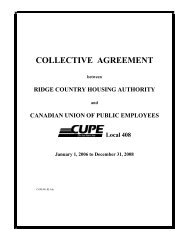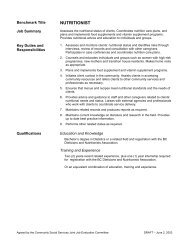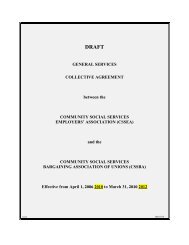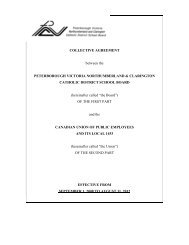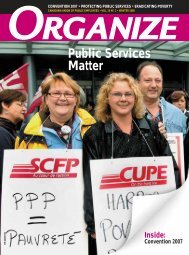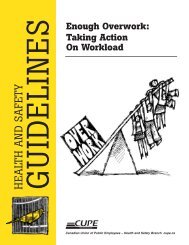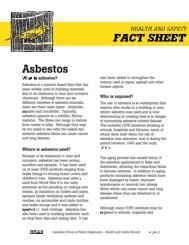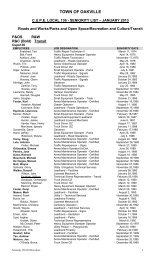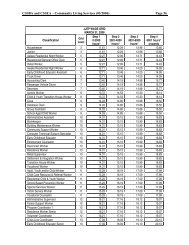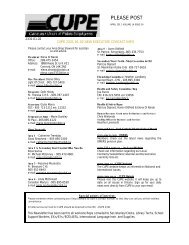International Solidarity Report - Canadian Union of Public Employees
International Solidarity Report - Canadian Union of Public Employees
International Solidarity Report - Canadian Union of Public Employees
You also want an ePaper? Increase the reach of your titles
YUMPU automatically turns print PDFs into web optimized ePapers that Google loves.
CUPE’S WORK ON<br />
INTERNATIONAL SOLIDARITY<br />
2005/2006
Cover: CUPE delegation at the People’s Summit <strong>of</strong> the Americas, Mar Del Plata,<br />
Argentina, November 2005.
CUPE’S WORK ON<br />
INTERNATIONAL SOLIDARITY<br />
CUPE has a long and proud history <strong>of</strong> international solidarity work guided by<br />
convention policy. In 2001 we adopted “On the front line locally and globally”. In<br />
2003, our strategic directions policy integrated international campaigns and strategic<br />
alliances as a core element <strong>of</strong> our work.<br />
In 2005, our national convention adopted a new strategic directions policy that,<br />
among other priorities, focuses on sectoral organizing. In this vein, the convention<br />
also supported the health care workers exchange that CUPE initiated in 2003 to<br />
create and strengthen the network among health care workers <strong>of</strong> the Americas.<br />
CUPE’s international work takes many forms and has grown significantly in<br />
recent years. Some <strong>of</strong> this work occurs through our affiliations and some through<br />
our global justice fund. We have also forged ties to other unions and some CUPE<br />
members work in international affairs as part <strong>of</strong> their jobs.<br />
This report summarizes our international solidarity work to help inform our union<br />
and to continue to use our resources in the most effective way possible.<br />
Affiliations<br />
<strong>Canadian</strong> Labour Congress (CLC)<br />
CUPE is the largest affiliate union <strong>of</strong> the 3 million-member CLC. In 2005, our<br />
annual affiliation dues to the CLC were $3.7 million. The CLC’s international department<br />
does extensive international work on a variety <strong>of</strong> fronts on behalf <strong>of</strong> affiliates,<br />
and coordinates projects all over the world.<br />
In addition to coordination, policy and advocacy work with the <strong>Canadian</strong> government,<br />
the CLC has a five-year funding agreement with the <strong>Canadian</strong> <strong>International</strong><br />
Development Agency (CIDA). CUPE is a partner in this agreement. CUPE<br />
also participates in the labour international development committee and in a number<br />
<strong>of</strong> other CLC campaigns, such as the “No Sweat” committee. The CLC website at<br />
www.clc-ctc.ca provides a detailed summary <strong>of</strong> its international work.<br />
CUPE regularly pr<strong>of</strong>iles international statements such as the May 2006 CLC<br />
Executive Council case for Canada to remove troops from Afghanistan and to support<br />
peace keeping efforts in Darfur.<br />
C A N A D I A N U N I O N O F P U B L I C E M P L O Y E E S<br />
1
CUPE members and others rally for cancellation <strong>of</strong> Third World debt<br />
Mehdi Kouhestaninejad <strong>of</strong> CUPE 3261, former president <strong>of</strong> CUPE Toronto district<br />
council and a long time activist in international solidarity issues, is now working in<br />
the international department <strong>of</strong> the CLC.<br />
<strong>International</strong> Confederation <strong>of</strong> Free Trade <strong>Union</strong>s (ICFTU)<br />
Through the CLC, we are affiliated with the <strong>International</strong> Confederation <strong>of</strong> Free<br />
Trade <strong>Union</strong>s (ICFTU), representing 148 million workers in 233 affiliated organizations<br />
in 153 countries. The upcoming ICFTU congress in November 2006 in Vienna,<br />
Austria will see the ICFTU merge with the 10 million members <strong>of</strong> the World Confederation<br />
<strong>of</strong> Labour, creating a new Trade <strong>Union</strong> <strong>International</strong>. CUPE has been a<br />
member <strong>of</strong> the ICFTU, through the CLC, since the inception <strong>of</strong> the CLC in 1956.<br />
Through the CLC we are also members <strong>of</strong> the ICFTU regional coordinating body,<br />
Inter-American Regional Organization <strong>of</strong> Workers (ORIT). ORIT’s objectives are to promote<br />
democratic unions and political, social and economic democracy in the Americas<br />
(www.icftu.org).<br />
CUPE is represented by the CLC at the <strong>International</strong> Labour Organization (ILO),<br />
a United Nations agency seeking the promotion <strong>of</strong> social justice and internationally<br />
recognized human and labour rights (www.ilo.org).<br />
<strong>Public</strong> Services <strong>International</strong> (PSI)<br />
CUPE is an affiliate <strong>of</strong> <strong>Public</strong> Services <strong>International</strong>. Membership cost $148,489<br />
in 2005. PSI is the global federation <strong>of</strong> public sector unions and advocates on<br />
behalf <strong>of</strong> public sector workers throughout the world. It represents over 650 trade<br />
unions in 150 countries with more than 20 million members (www.world-psi.org).<br />
2<br />
C U P E ’ S W O R K O N I N T E R N AT I O N A L S O L I D A R I T Y • 2 0 0 6
The following CUPE members and staff serve on PSI bodies:<br />
• Paul Moist, member, public sector working group<br />
• Donalda MacDonald, alternate member <strong>of</strong> the inter-Americas region<br />
women’s committee and <strong>of</strong> the world women’s committee<br />
• Kathy Corrigan, member, health services task force<br />
In March 2006, CUPE, along with the <strong>Public</strong> Service Alliance <strong>of</strong> Canada, the<br />
National <strong>Union</strong> <strong>of</strong> <strong>Public</strong> and General <strong>Employees</strong>, the Service <strong>Employees</strong>’ <strong>International</strong><br />
<strong>Union</strong>, the Centrale des syndicats du Québec, the Syndicat des pr<strong>of</strong>essionnelle-s<br />
du gouvernement du Québec, the Syndicat de la fonction publique du Québec<br />
and the Fédération des infirmières et infirmiers du Québec, organized and funded a<br />
successful PSI conference in Ottawa on new forms <strong>of</strong> privatization. Participants from<br />
Belize, Norway, South Africa, the United Kingdom and the United States shared<br />
experiences and strategies about privatization struggles and identified ways to work<br />
together effectively.<br />
CUPE was represented by National President Paul Moist, National Secretary-<br />
Treasurer Claude Généreux, and regional vice-presidents Donalda MacDonald,<br />
Candace Rennick, Donna Ryan, and D’Arcy Lanovaz. CUPE staff also attended and<br />
participated as organizers, facilitators and presenters. Roseanne Moran, a CUPE<br />
communications representative in British Columbia, presented a case study <strong>of</strong> the<br />
successful Vancouver Island Water Watch campaign on a conference panel.<br />
CUPE has been following the outcomes <strong>of</strong> a research initiative coordinated by PSI<br />
on the issues <strong>of</strong> migrant women health care workers. This study engages PSI affiliated<br />
unions in 15 participating countries around the world to campaign for improved<br />
funding for health services and to protect migrant workers’ rights. Canada has been<br />
represented on the project by the British Columbia Government <strong>Employees</strong>’ <strong>Union</strong>.<br />
The next PSI World Congress will be in Vienna, Austria, Sept. 24-28, 2007.<br />
CUPE members are part <strong>of</strong> the World March <strong>of</strong> Women<br />
C A N A D I A N U N I O N O F P U B L I C E M P L O Y E E S<br />
3
CUPE national executive board (NEB)<br />
CUPE’s NEB is charged with oversight on a range <strong>of</strong> international matters. The<br />
national executive committee (NEC) is the governing body for the global justice<br />
fund. The <strong>of</strong>fice <strong>of</strong> the national president directs international matters in conjunction<br />
with appropriate CUPE departments.<br />
Not a week goes by where there is not some letter, petition or other urgent<br />
action on international affairs or international human rights. For example, we have<br />
sent several letters to the president <strong>of</strong> Colombia, Álvaro Uribe Vélez, and to the<br />
<strong>Canadian</strong> government to denounce political massacres and repression in Colombia.<br />
We sent messages to the People’s Republic <strong>of</strong> China to express our deep concern<br />
about repression <strong>of</strong> protestors at the World Trade Organization (WTO) meetings in<br />
Hong Kong in December 2005, and we sent letters <strong>of</strong> solidarity to WTO political<br />
hunger strikers trying to draw attention to the unjust actions <strong>of</strong> the Hong Kong<br />
government during the WTO ministerial conference.<br />
We sent messages <strong>of</strong> solidarity to allies in the Philippines and to the government<br />
<strong>of</strong> the Philippines following the unilateral imposition <strong>of</strong> martial law and repression<br />
<strong>of</strong> activists in early 2006. We wrote to the minister <strong>of</strong> justice and attorney general<br />
<strong>of</strong> Canada to express our concern and support for CUPE member Gary Freeman<br />
(Toronto libraries) fighting extradition orders by the U.S. over an incident that took<br />
place more than 35 years ago.<br />
We stand in solidarity with our sisters and brothers in the Congress <strong>of</strong> South<br />
African Trade <strong>Union</strong>s (COSATU) in their struggles against neo-liberal policies being<br />
promoted at the WTO. We sent a message <strong>of</strong> solidarity to the general secretary <strong>of</strong><br />
COSATU and voiced our concerns about COSATU’s issues in a letter to Canada’s<br />
Minister <strong>of</strong> <strong>International</strong> Trade, David Emerson.<br />
CUPE provincial and service divisions<br />
There is a rich history <strong>of</strong> CUPE divisions’ involvement in international work. The<br />
following divisions have international solidarity/global justice committees:<br />
CUPE BC’s international solidarity committee works to raise awareness with<br />
members on international issues and the common interests <strong>of</strong> workers around<br />
the world. The committee is involved in international projects in Cuba, Colombia,<br />
and Central America through the B.C. development organization CoDevelopment<br />
Canada.<br />
4<br />
C U P E ’ S W O R K O N I N T E R N AT I O N A L S O L I D A R I T Y • 2 0 0 6
The CUPE BC international solidarity committee has developed The Wall Must<br />
Fall, an educational resource to help trade unionists and the public understand<br />
the issues and options facing the Palestine/Israel conflict. CUPE is distributing this<br />
educational resource among members, labour affiliates and community activists.<br />
At its 2005 convention, CUPE BC established the Colleen Jordan humanitarian<br />
fund to support its international work with dedicated per capita funding from the<br />
CUPE BC membership.<br />
With funding from the global justice fund, the CUPE BC international solidarity<br />
committee is sponsoring a project to provide human and labour rights training<br />
to members <strong>of</strong> SINTRAEMCALI, the public workers’ union in Cali, Colombia’s<br />
second largest city. Other long-standing projects support women factory workers<br />
(maquiladoras) in Central America and public sector workers in Cuba.<br />
CUPE BC and CoDevelopment Canada coordinated a visit by Carlos Gonzalez,<br />
president <strong>of</strong> SINTRAUNICOL, Colombia’s university workers’ union, to the B.C.<br />
division convention.<br />
The Hospital <strong>Employees</strong>’ <strong>Union</strong> global justice committee, also in B.C., is<br />
another long-standing member <strong>of</strong> CoDevelopment Canada with ongoing project<br />
partnerships in Central America in support <strong>of</strong> maquiladoras. HEU has also<br />
contributed and participated in the health care workers exchange, in partnership<br />
with the global justice fund. HEU leaders and members are activists on international<br />
issues and key organizers <strong>of</strong> international solidarity support campaigns in their<br />
communities.<br />
CUPE Alberta has a standing global justice committee that provides educational<br />
leadership and mobilizes members. The Alberta committee has focused on the<br />
issues facing migrant workers in Canada.<br />
The CUPE Saskatchewan global justice committee raises awareness among<br />
membership about international issues and our common ground with workers in<br />
other parts <strong>of</strong> the world. The committee implements CUPE National’s policies and<br />
programs on international solidarity, coordinates exchanges <strong>of</strong> labour activists,<br />
participates with other unions and organizations on campaigns about globalization<br />
and international trade agreements.<br />
The CUPE Manitoba global justice committee works on issues <strong>of</strong> union<br />
solidarity linking the struggles <strong>of</strong> CUPE Manitoba workers with struggles elsewhere<br />
in the world. The focus is on labour and solidarity issues in developing nations.<br />
The committee worked with other community organizations to host a fundraiser<br />
in 2005 that featured guest speaker Stephen Lewis. This event was co-sponsored<br />
by the Mennonite Central Committee, the Ugandan Society <strong>of</strong> Manitoba and<br />
St. Bartholomew’s Anglican church and raised $87,582. Half <strong>of</strong> this money is<br />
C A N A D I A N U N I O N O F P U B L I C E M P L O Y E E S<br />
5
Ed Thomas (CUPE 5167) visited the United Nations headquarters in New York<br />
to push for recognition <strong>of</strong> April 28, the Day <strong>of</strong> Mourning<br />
designated for work with children in Northern Uganda affected by war and HIV-<br />
AIDS. The committee also participated in CUPE Manitoba’s contracting out and<br />
privatization conference in 2005 to link and integrate international campaigns<br />
against privatization with local struggles.<br />
CUPE Ontario’s international solidarity committee was set up in recognition<br />
<strong>of</strong> the global nature <strong>of</strong> the struggle for workers’ rights. With a global capitalist<br />
economy, challenging the power <strong>of</strong> a single government becomes more and more<br />
difficult. With that in mind, the committee supports efforts to link CUPE members<br />
to activism happening throughout the world. It educates members on situations<br />
faced by workers in other countries by bringing representatives <strong>of</strong> other unions to<br />
Ontario. It also acts as a forum to share information about the connections between<br />
our lives and the work <strong>of</strong> others abroad.<br />
In 2005, the Ontario IS committee initiated a new coalition <strong>of</strong> trade unionists<br />
and community activists to strengthen solidarity work in their communities.<br />
CUPE Ontario has integrated global justice issues at many <strong>of</strong> their conferences.<br />
Division conventions in 2005 and 2006 hosted plenary panels on international<br />
issues with guest speakers from around the world. Division sectoral conferences<br />
integrate international analysis and campaigns, for example, the 2005 social services<br />
conference on globalization and privatization.<br />
The Ontario division has contributed financially to and participated in the health<br />
care workers exchange project.<br />
6<br />
C U P E ’ S W O R K O N I N T E R N AT I O N A L S O L I D A R I T Y • 2 0 0 6
CUPE Quebec participates in international work through the Fédération des<br />
travailleurs et travailleuses du Québec’s international affairs department. CUPE<br />
Quebec and a number <strong>of</strong> its locals have projects and relationships with unions<br />
around the world, such as one between hydro workers in Quebec and France.<br />
CUPE Prince Edward Island division has a standing international solidarity<br />
committee. The P.E.I. committee joined with other CUPE committees from Nova<br />
Scotia, Newfoundland/Labrador and New Brunswick to host (with community<br />
organizations such as Development and Peace) a tour <strong>of</strong> union leaders from<br />
FENSUAGRO, Colombia’s agricultural workers’ union, to the four provinces.<br />
CUPE divisions in Nova Scotia, New Brunswick and Newfoundland/Labrador<br />
have no standing committees, but are working to create them.<br />
CUPE’s airline division is affiliated with the <strong>International</strong> Transport Workers’<br />
Federation (ITF) representing 624 unions with 4.5 million workers in 142 countries.<br />
The ITF is allied with the <strong>International</strong> Confederation <strong>of</strong> Free Trade <strong>Union</strong>s<br />
(www.itfglobal.org).<br />
Our participation in ITF allows us to make representations at the UN’s<br />
<strong>International</strong> Civil Aviation Organization (ICAO) on transportation related matters<br />
(www.icao.int). Through the ITF, <strong>Canadian</strong> flight attendants are working with<br />
AMICUS, the union representing flight attendants at Air New Zealand, British<br />
Airways, Virgin Atlantic, EasyJet, Monarch and British Midland. The airline division<br />
also belongs to the North American Coalition <strong>of</strong> Flight Attendants, which lobbies for<br />
safe working conditions.<br />
CUPE locals and labour councils<br />
Many CUPE locals maintain their own international links, <strong>of</strong>ten associated with<br />
their occupations. For example, Quebec hydro locals cultivate relationships with<br />
electricity unions in France. Many <strong>of</strong> our municipal locals participate in water-related<br />
international activities, while our port workers are affiliated with the ITF.<br />
As members <strong>of</strong> CLC provincial labour councils <strong>of</strong> all affiliated unions, CUPE<br />
divisions and area councils across the country participate in local solidarity activities<br />
and host international delegations.<br />
CUPE BC, as a member <strong>of</strong> the Vancouver and District Labour Council, is<br />
organizing for the Labour Forum at the World Peace Forum in Vancouver in July<br />
2006.<br />
C A N A D I A N U N I O N O F P U B L I C E M P L O Y E E S<br />
7
CUPE Ontario, as a member <strong>of</strong> the Toronto and District Labour Council, hosts<br />
international delegations and organizes events and campaigns on international<br />
issues.<br />
Many CUPE locals and activists have participated in successful local campaigns<br />
to have their city adopt “No Sweat” policies to ensure ethical procurement policy.<br />
CUPE members at international agencies<br />
Many <strong>of</strong> our members work directly for international agencies providing support<br />
and services on an international level. They are amongst our most committed<br />
international activists.<br />
Oxfam (www.oxfam.ca) – Founded in 1963, Oxfam Canada is a non-pr<strong>of</strong>it<br />
international development organization that supports community programs in<br />
food security, health, nutrition and democratic development with an emphasis on<br />
working with women. (CUPE 2722)<br />
CUSO (www.cuso.org) – CUSO is a <strong>Canadian</strong>-based international development<br />
organization working with partner groups and individuals to foster equality and<br />
freedom, safeguard cultures and communities, and protect the environment.<br />
(CUPE 2440)<br />
KAIROS (www.kairoscanada.org) – As the coordinating body <strong>of</strong> <strong>Canadian</strong><br />
churches, KAIROS works on international issues such as debt, energy, water, HIV-<br />
AIDS, human rights, trade and poverty. (CUPE 4557)<br />
CoDevelopment Canada (www.CoDevelopment.org) – This 26-year old<br />
organization works to form partnerships between groups in B.C. and in Latin<br />
America to build alliances for social change. The partnerships involve unions<br />
(including CUPE), community groups, women’s organizations and unions in Latin<br />
America and Cuba. This model has strengthened affiliates’ international work<br />
through project delivery and educational work among members. (CUPE 1004-13)<br />
<strong>Canadian</strong> Council for <strong>International</strong> Cooperation (CCIC) (www.ccic.ca) – The<br />
council is a coalition <strong>of</strong> <strong>Canadian</strong> voluntary sector organizations working globally<br />
to achieve sustainable human development. The CCIC seeks to end global poverty<br />
and to promote social justice and human dignity for all. It has co-chaired the “Make<br />
Poverty History” campaign. CUPE has supported this campaign directly and with<br />
financial support and through actions coordinated by the CLC. (CUPE 3371)<br />
8<br />
C U P E ’ S W O R K O N I N T E R N AT I O N A L S O L I D A R I T Y • 2 0 0 6
CUPE bilateral relationships<br />
Our union has a history <strong>of</strong> strong bilateral relations with unions throughout the<br />
world, including:<br />
• South African Municipal Workers’ <strong>Union</strong><br />
(www.samwu.org.za)<br />
• National Health Education and Allied<br />
Workers <strong>Union</strong> in South Africa<br />
(www.nehawu.org.za)<br />
• UNISON, representing public service<br />
workers across the U.K.<br />
(www.unison.org.uk)<br />
• <strong>Union</strong> <strong>of</strong> State Workers (ATE) in<br />
Argentina: www.ateargentina.org.ar<br />
• SINTRAUNICOL, the Colombian<br />
university workers’ union<br />
(www.sintraunicol.univalle.edu.co)<br />
• The Municipal Workers <strong>Union</strong> <strong>of</strong> EMCALI<br />
(SINTRAEMCALI) in Cali, Colombia<br />
• Longstanding relationships with the Cuba<br />
Trade <strong>Union</strong> Central<br />
SAMWU vice-president<br />
Xolile Nxu at CUPE’s<br />
national convention<br />
CUPE’s global justice fund and committee<br />
CUPE’s global justice fund (formerly known as the union aid fund) was<br />
established in 1993. Its primary sources <strong>of</strong> revenue are from CUPE National, the<br />
CLC, CIDA, CUPE locals, members and staff. The fund has annual revenues <strong>of</strong><br />
about $100,000. It is vital that CUPE locals contribute to the fund in order to make<br />
it more effective. All contributions are welcome. For example, CUPE 2440 at CUSO<br />
recently held an event that raised $335 for the fund.<br />
The national global justice committee recommends the funding <strong>of</strong> projects<br />
to CUPE’s national executive committee (NEC) according to approved criteria<br />
and strategic goals as established by 2001 convention policy. The global justice<br />
committee follows an approved strategic work plan and has terms <strong>of</strong> reference<br />
approved by the national executive board.<br />
C A N A D I A N U N I O N O F P U B L I C E M P L O Y E E S<br />
9
Projects funded by the global justice fund in the past year include:<br />
• Cuba: The third health care workers’ exchange, Havana, May 2006. With<br />
support and participation from Hospital <strong>Employees</strong> <strong>Union</strong>, the Ontario<br />
Council <strong>of</strong> Hospital <strong>Union</strong>s, the Ontario Division, <strong>Canadian</strong> Auto Workers<br />
and the Ontario Federation <strong>of</strong> Labour. The exchange has grown from the<br />
inaugural event hosted by CUPE in 2003 in Canada and now includes union<br />
representatives from 23 countries in South, Central and North America and<br />
the Caribbean. PSI supports and participates in this initiative.<br />
• Guatemala: “Radio Libertad,” with the Peten Alliance for Life and<br />
Peace, sponsored by CUPE 1281 has launched a community radio and<br />
communications strategy in the remote Peten region, which is largely<br />
inhabited by indigenous groups. Believing that “information is power,” the<br />
project provides alternative voices to corporate media to strengthen the<br />
struggle to build a democratic and just society.<br />
• Cuba: Strengthening solidarity with Cuban public sector unions and<br />
CUPE, with SNTAP – the National <strong>Union</strong> <strong>of</strong> <strong>Public</strong> Sector Workers <strong>of</strong><br />
Cuba, sponsored by CUPE BC. The example set by Cuba continues to be<br />
an important one for workers worldwide. CUPE BC has partnered with<br />
SNTAP for many years to build solidarity links between Cuba and Canada,<br />
in particular in the trade union movement. This project supports training in<br />
pr<strong>of</strong>essional development and union responsibilities for the SNTAP Havana<br />
branch and its members. CUPE BC and CoDevelopment Canada, work<br />
together to raise awareness <strong>of</strong> Cuba and its public sector workers in Canada.<br />
• Colombia/Canada tour: Two front line tours <strong>of</strong> Colombia for public sector<br />
workers from CUPE, the <strong>Public</strong> Service Alliance <strong>of</strong> Canada and the <strong>Canadian</strong><br />
<strong>Union</strong> <strong>of</strong> Postal Workers. The tours are planned for late summer and early<br />
fall 2006. Following the successful <strong>Canadian</strong> tour <strong>of</strong> five Colombia trade<br />
union and community activists, hosted by the three national unions and<br />
the CLC, these educational tours will allow <strong>Canadian</strong> participants to meet<br />
with their sister unions and organizations in Colombia. The goal is to build<br />
and strengthen solidarity links between Colombian and <strong>Canadian</strong> public<br />
sector workers and to explore practical and project work that will bolster<br />
our anti-privatization fight. Colombia is one <strong>of</strong> the world’s most dangerous<br />
places for trade unionists. Since 1989, it has been reported that more than<br />
10<br />
C U P E ’ S W O R K O N I N T E R N AT I O N A L S O L I D A R I T Y • 2 0 0 6
CUPE 401 president Rodger Oakley (left), Santiago Araconada Rodriguez, a<br />
representative <strong>of</strong> the Venezuelan public water company, and Saskatchewan<br />
NEB vice-president Frank Mentes at the World Water Forum in Mexico City<br />
3,000 unionists have been assassinated there. One <strong>of</strong> the main challenges<br />
confronting public sector unions in Colombia is privatization. Colombian<br />
unions are fighting to resist losing public control over public services – the<br />
same fight in which CUPE and other <strong>Canadian</strong> public sector unions are<br />
engaged. These tours will deepen our understanding <strong>of</strong> how to organize with<br />
the local community and will build support for anti-privatization struggles.<br />
• Colombia: A human rights training school for Colombian public sector<br />
workers, a partnership with SINTRAEMCALI/NOMADESC in Cali, sponsored<br />
by CUPE BC. This project links the struggles against privatization in Canada<br />
with our sister union in Cali. This is the third year <strong>of</strong> support for the training<br />
school, which helps members to understand and defend their human rights<br />
and those <strong>of</strong> their communities. It also trains new leaders, which in turn<br />
strengthens the union and the community. In turn, CUPE BC and the project<br />
coordinator, CoDevelopment Canada, are building a base <strong>of</strong> awareness<br />
among CUPE members <strong>of</strong> the labour rights situation in Colombia and the<br />
importance <strong>of</strong> anti-privatization resistance there and here. CUPE BC hosted a<br />
NOMADESC representative at its April 2006 convention.<br />
C A N A D I A N U N I O N O F P U B L I C E M P L O Y E E S<br />
11
• Nicaragua: An ongoing project to empower women maquila workers, with<br />
an emphasis on capacity building and training for mediation, negotiation<br />
and conflict resolution. In partnership with the Maria Elena Cuadra (MEC)<br />
Women’s Movement/Centre, sponsored by CUPE BC and in cooperation<br />
with CUPE members who work with CoDevelopment Canada, this long-term<br />
partnership project works with women maquila workers in the free-trade<br />
zones to defend their rights. The centre’s mobile law firm assisted over 2,000<br />
maquila workers facing problems. Educational and communication materials<br />
train women leaders in mediation and negotiation skills. MEC’s Ninth<br />
National Forum for Maquila Workers will take place in March 2007. More<br />
than 1,200 women workers are expected to participate.<br />
• Honduras: An ongoing project to empower women maquila workers<br />
in occupational health and safety. This is sponsored by HEU/CUPE in<br />
partnership with the Honduran Women’s Collective CODEMUH. Over 85 per<br />
cent <strong>of</strong> HEU members are women and they are under the same global attack<br />
on their rights as workers throughout the world. HEU and CUPE National are<br />
working towards global partnerships that will strengthen our ability to win<br />
on a global scale. This project trains women maquila workers so they can<br />
defend their rights and participate in international campaigns and research.<br />
HEU, with the coordination <strong>of</strong> CUPE members at CoDevelopment Canada,<br />
is committed to ongoing solidarity partnerships and raising the awareness <strong>of</strong><br />
<strong>Canadian</strong> workers regarding the situation <strong>of</strong> women in Honduras, especially<br />
in the free trade zones.<br />
• Central America: An ongoing project to help women maquila workers with<br />
the Central American Women’s Network sponsored by HEU/CUPE working<br />
with CODEMUH. The project works to influence the labour policies <strong>of</strong><br />
Central American governments and maquila companies to eradicate labour<br />
rights violations <strong>of</strong> maquila workers. The project works with members<br />
<strong>of</strong> the network to strengthen their ability to promote and defend labour<br />
rights. It also promotes greater awareness and defense <strong>of</strong> occupational<br />
health and safety rights. In this phase <strong>of</strong> the project, the network will<br />
launch a public campaign focused on labour rights for maquila workers,<br />
specifically on occupational health and safety issues. The campaign will take<br />
place in Guatemala, Honduras, El Salvador and Nicaragua through a public<br />
awareness initiative (media, posters, educational materials, etc.) This project<br />
is coordinated by CUPE members at CoDevelopment Canada.<br />
12<br />
C U P E ’ S W O R K O N I N T E R N AT I O N A L S O L I D A R I T Y • 2 0 0 6
• South Africa: Following the successful and ground-breaking “Gender<br />
and local government restructuring (privatization)” research and policy<br />
development project undertaken by the South African Municipal Workers’<br />
<strong>Union</strong> (SAMWU) in 2003/4, CUPE national services and the national<br />
committee for global justice are supporting phase two <strong>of</strong> SAMWU’s<br />
work, which will identify an effective model to organize and serve women<br />
members threatened by privatization.<br />
• The SAMWU coordinator <strong>of</strong> the first project, Melanie Samson, has returned<br />
to Canada to complete her PhD studies. She is now a member <strong>of</strong> CUPE<br />
3903 (York University). We are supporting the presentation <strong>of</strong> her research<br />
findings at the <strong>International</strong> Sociological Association’s World Congress in July<br />
2006 in Durban, South Africa.<br />
Financial contributions<br />
CUPE National contributes to campaigns, events and activities with other labour<br />
affiliates or social partners. In the past year we have contributed to costs <strong>of</strong> the People’s<br />
Summit and Women’s Tribunal at the Summit <strong>of</strong> the Americas in Argentina, and to the<br />
Rebel Music Americas Tour in Canada that built cultural links with the People’s Summit.<br />
We contributed to events marking the 30th anniversary <strong>of</strong> the 1976 Argentina coup.<br />
CUPE National supported the “Make Poverty History” international campaign<br />
in Canada, and purchased white bands to distribute at national and division<br />
conventions during the year.<br />
CUPE supported the development <strong>of</strong> a new union in Iran, through the<br />
<strong>International</strong> Alliance in Support <strong>of</strong> Workers in Iran and the Syndicate <strong>of</strong> Workers <strong>of</strong><br />
Tehran and Suburbs Bus Company.<br />
Peace activities<br />
CUPE has an established record <strong>of</strong> working with the peace movement. We are<br />
formally aligned with the <strong>Canadian</strong> Peace Alliance (www.acp-cpa.ca) and make<br />
annual donations to their work.<br />
CUPE participates in peace marches throughout Canada and many <strong>of</strong> our<br />
divisions and locals regularly make donations to regional peace bodies.<br />
C A N A D I A N U N I O N O F P U B L I C E M P L O Y E E S<br />
13
A Japanese activist poses with the CUPE banner at a World Water Day event in<br />
Mexico City, March 2006<br />
CUPE National supported the participation <strong>of</strong> Ali Mallah (CUPE 79) at the<br />
<strong>International</strong> Peace Conference in London in December 2005. This conference<br />
established March 18, 2006, as <strong>International</strong> Day <strong>of</strong> Protest against the War and<br />
supported the Fourth Cairo Conference against the war and occupation. For more<br />
information on the <strong>International</strong> Peace Conference visit the www.stopthewar.uk<br />
website. We also supported Mallah’s participation in the Fourth Cairo Conference<br />
on Peace in the Middle East in March 2006.<br />
Canada will host the World Peace Forum in Vancouver June 23-28, 2006. CUPE<br />
National and division activists will financially support and participate in this forum to<br />
mobilize against militarism and war and for peace and security in the world. CUPE<br />
BC is working with the Vancouver and District Labour Council, the B.C. Federation<br />
<strong>of</strong> Labour and with community allies to promote labour activities at the forum<br />
(www.worldpeaceforum.com).<br />
Humanitarian work<br />
CUPE National provided humanitarian contributions to groups working with the<br />
victims <strong>of</strong> hurricanes in the U.S. Gulf Coast, Cuba and Central America and <strong>of</strong> the<br />
earthquake in Pakistan and Northern India.<br />
14<br />
C U P E ’ S W O R K O N I N T E R N AT I O N A L S O L I D A R I T Y • 2 0 0 6
<strong>International</strong> policy<br />
Our union has a long tradition <strong>of</strong> international work in many key policy areas.<br />
Water<br />
CUPE, along with the Council <strong>of</strong> <strong>Canadian</strong>s and the Polaris Institute, is pursuing<br />
a more active role in Red Vida, a coordinated effort supported by PSI to resist<br />
the privatization <strong>of</strong> water across the hemisphere. In March 2006, CUPE delegates<br />
participated in a people’s counter-conference at the World Water Forum meetings<br />
in Mexico City. Our delegates included Frank Mentes, regional vice-president for<br />
Saskatchewan and Rodger Oakley (CUPE 401), chair <strong>of</strong> the Vancouver Island Water<br />
Watch, along with two CUPE staff members.<br />
Health care<br />
In 2003, CUPE hosted the first health care workers exchange with five health<br />
care unions from Central and South America. In 2004, CUPE participated in<br />
and supported the second exchange in Buenos Aires, Argentina, and organized<br />
participation and financial support from the <strong>Canadian</strong> Auto Workers and the<br />
Steelworkers. Representatives from health unions in Argentina, Brazil, Canada,<br />
Chile, Colombia, Cuba, Dominican Republic, El Salvador, Guatemala, Paraguay,<br />
Uruguay, and Venezuela attended.<br />
In May 2006, the Cuban Health Care Workers <strong>Union</strong> and the CTC (similar to<br />
the CLC) hosted the third exchange with 80 delegates representing 23 countries.<br />
CUPE’s delegation included: Pearl Blommaert (national health and safety committee<br />
co-chair), Nancy Ingalls (national health issues committee member), Serge Lalonde<br />
(national health issues committee member), Bonifacio Barcia (CUPE/HEU), Louis<br />
Rodrigues (CUPE/OCHU), CUPE Ontario president and general vice-president Sid<br />
Ryan. Staff support was provided by Gwen Hewitt, CUPE’s representative on the<br />
health workers exchange secretariat. Edgar Godoy worked with other <strong>Canadian</strong><br />
labour affiliates to participate and support this growing movement. CUPE’s global<br />
justice fund contributes to the cost <strong>of</strong> the event and <strong>of</strong> supporting the participation<br />
<strong>of</strong> unions from South and Central America and the Caribbean.<br />
C A N A D I A N U N I O N O F P U B L I C E M P L O Y E E S<br />
15
<strong>International</strong> trade<br />
Common Frontiers is a multi-sector working group that confronts and<br />
proposes alternatives to the effects <strong>of</strong> economic integration in the Americas. The<br />
group provides research and analysis in cooperation with labour, human rights,<br />
environmental, church, development and economic and social justice organizations.<br />
CUPE is an active member <strong>of</strong> Common Frontiers and, through it, is a member <strong>of</strong> the<br />
Hemispheric Social Alliance (www.commonfrontiers.ca).<br />
In November 2005, CUPE participated in CLC/PSI delegations to the People’s<br />
Summit <strong>of</strong> the Americas and PSI health workers meetings in Mar del Plata,<br />
Argentina. We worked with Common Frontiers and the Hemispheric Social Alliance<br />
to share our experiences and build resistance to the Free Trade Agreement <strong>of</strong> the<br />
Americas agenda. We participated in the labour forum at the People’s Summit that<br />
launched the first labour agenda for the Americas. This document was published in<br />
four languages and is available from the CLC.<br />
Our delegation included John Evans (HEU global justice committee chair), Helen<br />
Fetterly (OCHU), Donna Ryan (regional vice-president for Newfoundland and<br />
Labrador), Edgar Godoy (health exchange secretariat and national global justice<br />
committee member), Barbara Wood (CUPE 1004 member at CoDevelopment<br />
Canada), Sid Ryan (general vice-president and CUPE Ontario president), Claude<br />
Généreux (national secretary-treasurer) and Florencia Berenstein (Ontario international<br />
solidarity committee). Staff support was provided by Stan Marshall, managing director<br />
<strong>of</strong> national services, and Cheryl Stadnichuk, research representative in Saskatchewan.<br />
CUPE is involved in WTO-related work through PSI and our alliances with the<br />
Council <strong>of</strong> <strong>Canadian</strong>s and the Polaris Institute. Through the <strong>Canadian</strong> Centre for<br />
Policy Alternatives, CUPE supported an analysis <strong>of</strong> trade agreements that will play a<br />
significant role in the development <strong>of</strong> international responses to trade agreements.<br />
In December 2005, CUPE participated in the CLC delegation to the WTO<br />
ministerial talks in Hong Kong. National President Paul Moist, National Secretary-<br />
Treasurer Claude Généreux, CUPE Quebec president and general vice-president<br />
Mario Gervais and CUPE BC president and general vice-president Barry O’Neill joined<br />
delegates from other major <strong>Canadian</strong> unions, the Council <strong>of</strong> <strong>Canadian</strong>s and the Polaris<br />
Institute, plus thousands <strong>of</strong> activists, non-governmental organizations and other lobby<br />
groups protesting the unfairness <strong>of</strong> WTO deals for developing countries and workers.<br />
CUPE helped fund a research paper for SAMWU, written by <strong>Canadian</strong> Centre<br />
for Policy Alternatives research associate Scott Sinclair, on the impact <strong>of</strong> international<br />
trade agreements on public services in South Africa.<br />
16<br />
C U P E ’ S W O R K O N I N T E R N AT I O N A L S O L I D A R I T Y • 2 0 0 6
CUPE is also supporting research by Dr. Pat Armstrong and York University that<br />
compares <strong>Canadian</strong> and Northern European long-term care workers and workplaces.<br />
CUPE-sponsored international delegations<br />
We were pleased to host guests from South Africa, the Philippines, Argentina,<br />
Australia, the U.K. and the U.S. at our national convention in Winnipeg in October<br />
2005. Following the convention, we organized a speaking tour for Josua Mata,<br />
general secretary <strong>of</strong> the Alliance for Progressive Labour in the Philippines.<br />
CUPE participation in international events<br />
CUPE leadership, activists and staff participate in international events, supported<br />
by the global justice fund, bilateral projects or as part <strong>of</strong> on-going activities or<br />
special request/invitations from our international affiliates.<br />
We continue to support the work <strong>of</strong> Ed Thomas (CUPE 5167) from Ontario<br />
at the United Nations Commission on Sustainable Development (CSD), with the<br />
ICFTU delegation in recognition <strong>of</strong> April 28, <strong>International</strong> Commemoration Day<br />
for Dead and Injured Workers. Thomas is a leading health and safety activist and<br />
resource person, recognized within CUPE and the <strong>International</strong> community for his<br />
contribution and leadership. Each year, the ICFTU delegation <strong>of</strong> about 50 trade<br />
unionists go to New York for up to two weeks to meet with and lobby members <strong>of</strong><br />
the CSD and UN representatives.<br />
The <strong>International</strong> “Workers Out” Conference will be held in Montreal in July<br />
2006. As members <strong>of</strong> the organizing committee for this conference, we sponsored<br />
national pink triangle committee members Jean-Pierre LeClerc and Dale McClure to<br />
the <strong>International</strong> Lesbian and Gay Association Conference in Geneva, Switzerland in<br />
March 2006. They received staff support from Michael Butler, executive assistant to<br />
the CUPE national secretary-treasurer.<br />
Martine Stonehouse, a member <strong>of</strong> CUPE 4400, will attend the Ninth <strong>International</strong><br />
Conference on Bisexuality in Toronto, June 15-18, 2006 (www.9icb.org).<br />
Edgar Godoy, a national global justice committee member, represented CUPE at<br />
the National <strong>Union</strong> <strong>of</strong> the Social Security Institute conference on social security in<br />
Mexico in August 2005, to speak about the health care workers exchange project.<br />
CUPE staff members serve on international committees, providing training<br />
and resources to our sister unions internationally. National researcher Darcy Beggs<br />
represented the CLC and CUPE at an international pension fund trustee meeting<br />
organized by the Committee on Workers’ Capital <strong>of</strong> the ICFTU in Britain in July 2005.<br />
C A N A D I A N U N I O N O F P U B L I C E M P L O Y E E S<br />
17
CUPE researcher Cheryl Stadnichuk at the People’s Summit <strong>of</strong> the Americas<br />
in Mar Del Plata, Argentina, with Dora Martinez <strong>of</strong> ATE, the health care union<br />
in Argentina<br />
Harminder Magon, national equality branch staff, represented the CLC and<br />
CUPE at an ILO meeting on labour migration in Geneva in November 2005.<br />
Kathleen Corrigan, HEU/CUPE research staff, attended a meeting <strong>of</strong> the PSI health<br />
issues committee in Geneva in May 2006.<br />
In February 2006, Anne Didier-Floyd, national research and job evaluation<br />
staff member, provided training on behalf <strong>of</strong> the PSI at a job evaluation workshop<br />
in Nairobi, Kenya. Floyd and representatives from Kenyan unions met with the<br />
ministers <strong>of</strong> the regional and local governments. A major breakthrough was<br />
celebrated when the regional government agreed to change the existing job<br />
evaluation process, which had been undertaken without consulting the unions. The<br />
unions will now be able to review materials and comment on them. The government<br />
also agreed the process would not be implemented without the unions’ support.<br />
The local government also agreed to a joint job evaluation process.<br />
Stan Marshall represented CUPE at the UNISON health sector conference in the<br />
U.K. in April 2006.<br />
In November 2005, Janice Folk-Dawson <strong>of</strong> CUPE 1334, Frank Ventresca <strong>of</strong><br />
CUPE 4156 and CUPE National research staff Margot Young and Paul O’Donnell<br />
represented CUPE on an Ontario Federation <strong>of</strong> Labour P3 exchange with unions<br />
fighting privatization in Britain.<br />
Peter Barnacle, a legal and legislative representative in Saskatchewan,<br />
participates with our support in the <strong>International</strong> Commission for Labour Rights<br />
(ICLR), a not-for-pr<strong>of</strong>it agency <strong>of</strong> labour lawyers around the world who investigate<br />
labour rights, with a focus on Colombia.<br />
18<br />
C U P E ’ S W O R K O N I N T E R N AT I O N A L S O L I D A R I T Y • 2 0 0 6
Coming events<br />
• World Urban Forum, Vancouver, June 19-23, 2006<br />
• World Peace Forum, Vancouver, June 23-28, 2006<br />
• Workers Out <strong>International</strong> Conference, Montreal Outgames,<br />
July 26-29, 2006<br />
• <strong>International</strong> HIV-AIDS Conference, Toronto Labour Forum,<br />
Aug. 13-18, 2006<br />
• <strong>International</strong> Confederation <strong>of</strong> Free Trade <strong>Union</strong>s and the World<br />
Confederation <strong>of</strong> <strong>Union</strong>s merger convention, Vienna, Austria,<br />
November 2006<br />
• World Social Forum, Nairobi, Kenya, Jan. 20-25, 2007<br />
• World Congress <strong>of</strong> PSI, Vienna, Austria, Sept. 24-28, 2007<br />
CUPE advocacy<br />
We are proud to lend our union’s name and influence to a variety <strong>of</strong><br />
international lobbying and advocacy initiatives.<br />
We continue to lobby the government <strong>of</strong> Canada to increase its international<br />
aid contribution to 0.07 per cent <strong>of</strong> gross domestic product. As members <strong>of</strong><br />
the <strong>Canadian</strong> Council for <strong>International</strong> Cooperation, we endorse “Make Poverty<br />
History”, an international campaign on debt, trade, and poverty to pressure<br />
governments to live up to their commitments.<br />
We speak out constantly against mistreatment <strong>of</strong> workers throughout the world.<br />
We share petitions and encourage our members to support such initiatives. We<br />
support our sisters and brothers in other organizations and movements to which we<br />
are aligned.<br />
cope 491<br />
C A N A D I A N U N I O N O F P U B L I C E M P L O Y E E S<br />
19


